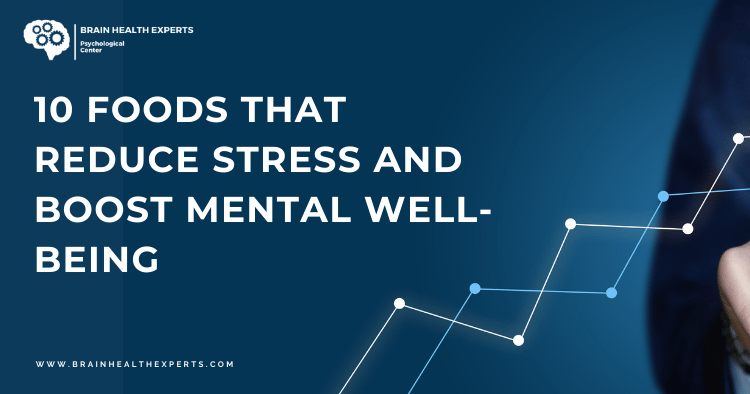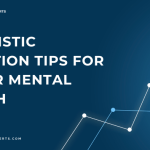- Introduction
- The Connection Between Nutrition and Stress
- Top 10 Foods to Reduce Stress
- 1. Fatty Fish
- 2. Dark Chocolate
- 3. Nuts and Seeds
- 4. Leafy Greens
- 5. Berries
- 6. Avocados
- 7. Fermented Foods
- 8. Whole Grains
- 9. Herbal Tea
- 10. Citrus Fruits
- Frequently Asked Questions
- Conclusion
Introduction
Stress is an inevitable part of life, but how we manage it can significantly influence our mental well-being. Did you know that what you eat can play a pivotal role in how you feel? Nutrition is not just about fueling your body; it’s also about nourishing your mind. In this article, we’ll explore ten delicious foods that can help reduce stress and enhance your mental well-being.
The Connection Between Nutrition and Stress
The food we consume has a profound impact on our mood and stress levels. Certain nutrients can help regulate neurotransmitters and hormones related to stress, such as cortisol. Balancing your diet with the right foods can enhance your resilience to stress and improve your overall mental health.
Research indicates that diets rich in fruits, vegetables, and omega-3 fatty acids can lower stress levels and improve mood.
A study published in Nature Reviews Neuroscience underscores the importance of nutrition in mental health management, emphasizing how specific foods can help combat stress and anxiety. For more insights, check out our article on 10 Proven Stress Management Techniques for Daily Relief.
Top 10 Foods to Reduce Stress
1. Fatty Fish
Fatty fish, such as salmon, mackerel, and sardines, are rich in omega-3 fatty acids. These essential fats are known to reduce anxiety and depression. Studies suggest that omega-3s can help lower cortisol levels, the hormone associated with stress. Try to include at least two servings of fatty fish in your weekly diet to reap the benefits.
Including fatty fish in your diet can be a delicious way to support your mental well-being.
2. Dark Chocolate
Good news, chocolate lovers! Dark chocolate contains flavonoids, which can help improve blood flow to the brain and reduce stress hormones. A small piece of dark chocolate (70% cocoa or higher) can not only satisfy your sweet tooth but also elevate your mood. Just remember, moderation is key! For more on mood enhancement, explore our article on 10 Powerful Affirmations to Boost Mental Health Today.
3. Nuts and Seeds
Nuts and seeds, including almonds, walnuts, and sunflower seeds, are packed with magnesium, which has been linked to lower levels of anxiety. A handful of nuts can be a great snack option that also stabilizes blood sugar levels, preventing mood swings. This makes them a perfect addition to your daily routine.
A handful of nuts can be more than just a snack; it can be a small step towards better mental health.
4. Leafy Greens
Leafy greens such as spinach, kale, and swiss chard are rich in folate, a nutrient that helps produce dopamine, the “feel-good” hormone. Incorporating leafy greens into your meals can enhance your emotional well-being. Consider adding them to smoothies, salads, or as a side dish.
5. Berries
Berries, especially blueberries, are loaded with antioxidants, which can combat oxidative stress in the body. The natural sugars in berries can provide a quick energy boost without the crash associated with processed sugars. They can be enjoyed fresh, in smoothies, or as a topping for yogurt.
Make berries your go-to snack for a healthy energy boost!
6. Avocados
Avocados are not only delicious but also contain healthy fats, fiber, and potassium. These nutrients can help lower blood pressure, which is often elevated during stressful times. A slice of avocado on toast or in a salad can add both flavor and stress-reducing benefits to your meals.
7. Fermented Foods
Fermented foods like yogurt, kefir, and kimchi are rich in probiotics, which can enhance gut health. A healthy gut is closely linked to improved mood and reduced anxiety. Including these foods in your diet can support both your digestive and mental health. For more insights on mental wellness, check out 10 Proven Techniques for Effective Goal Setting Success.
Fermented foods are a tasty way to nourish your gut and mind simultaneously.
8. Whole Grains
Whole grains such as oats, quinoa, and brown rice provide a steady release of glucose into the bloodstream, which can help maintain energy levels and prevent mood swings. They are also rich in B vitamins, which are essential for brain health. Start your day with oatmeal to keep stress at bay.
9. Herbal Tea
Herbal teas, especially chamomile and green tea, have calming properties that can reduce stress. Chamomile tea is known for its mild sedative effects, while green tea contains L-theanine, an amino acid that promotes relaxation. Brew a cup of your favorite herbal tea in the evening to unwind after a long day.
A warm cup of herbal tea can be your evening ritual for relaxation.
10. Citrus Fruits
Citrus fruits like oranges, lemons, and grapefruits are high in vitamin C, which can help lower cortisol levels. Eating citrus fruits can also provide a refreshing boost to your mood. Consider starting your day with a glass of fresh orange juice or adding lemon to your water for an uplifting twist.
| Food | Key Nutrients | Stress-Reducing Benefits |
|---|---|---|
| Fatty Fish | Omega-3 Fatty Acids | Lowers cortisol levels |
| Dark Chocolate | Flavonoids | Improves mood and reduces anxiety |
| Nuts and Seeds | Magnesium | Stabilizes mood and reduces anxiety |
| Leafy Greens | Folate | Produces dopamine |
| Berries | Antioxidants | Combats oxidative stress |
| Avocados | Healthy Fats | Lowers blood pressure |
| Fermented Foods | Probiotics | Enhances gut and mental health |
| Whole Grains | B Vitamins | Maintains energy levels |
| Herbal Tea | L-Theanine (green tea) | Promotes relaxation |
| Citrus Fruits | Vitamin C | Lowers cortisol levels |
Frequently Asked Questions
Q: Can diet really affect my stress levels?
A: Absolutely! A balanced diet rich in specific nutrients can significantly impact your mood and stress response. Foods high in omega-3s, antioxidants, and vitamins can help reduce anxiety and improve mental clarity.
Nutrition is a powerful tool for managing stress—use it wisely!
Q: How quickly can I expect to see changes in my stress levels?
A: While individual responses may vary, incorporating these foods into your diet can lead to improvements in mood and stress management within a few weeks. Consistency is key!
Q: Are there foods I should avoid to manage stress?
A: Yes, try to limit caffeine, sugar, and processed foods, as they can contribute to anxiety and mood swings. Instead, focus on whole, nutrient-dense foods.
Conclusion
Managing stress through nutrition is an accessible and effective approach to enhancing your mental well-being. By incorporating these ten stress-reducing foods into your diet, you’ll not only nourish your body but also promote a healthier mind.
Remember, small changes can lead to significant improvements over time.
So, why not start your journey to a more relaxed and balanced life today?
For more information on nutrition and mental health, check out Mental Health America for helpful resources and tips. Also, consider exploring 10 Positive Thinking Techniques to Reduce Stress to complement your dietary changes with powerful mental strategies.





